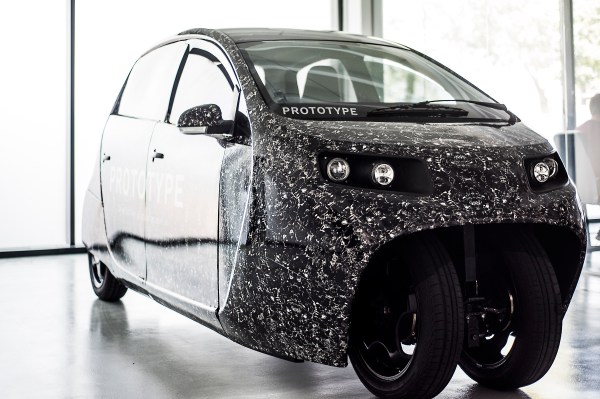Danish startup Spiri revealed their on-demand carpooling service in late August, and is now ready to show off its first prototype vehicle. The company decided to build its own all-electric car from the ground up, using an engineering team with talent from Aston Martin, Tesla and more, in order to arrive at a final product that best suits the needs of frequent, multi-passenger urban navigation.
Spiri stresses that this is still very much a prototype, with ex-Tesla VP and Spiri board member Peter Carlsson calling it “basically a lab on wheels” in a press release accompanying the unveiling. The idea is to tweak features including handling, interior cabin space, range and safety options through testing before deciding on what the final Spiri vehicle will look like once it hits roads in active use.
The current Spirit car design only weighs around 992 lbs., which is way less than the Tesla Model S starting at 4,597 lbs., or even the BMW i3 at 2,635 lbs. The startup achieved that weight by basically throwing out everything on a standard car that “add[s] zero value to a person’s daily commute and travel,” according to Spiri CEO Stefan Holm Nielsen in a statement. That means there aren’t any interior body panels, and around one-quarter of the total parts used in making a regular consumer car. There isn’t even any paint. Plus, the vehicle’s body is entirely made out of carbon fibre, a light but strong material commonly used by EV makers to shave off valuable ounces in service of efficiency.
[gallery ids="1389343,1389344,1389345,1389346"]
Spiri does have a bit more tech on-board than your average car, however, since it’s constantly connected to the cloud in order to ensure the cars are monitored throughout their use for safety. Passengers are also registered via the Spiri app and matched with others using the startup’s algorithms to maximize the effectiveness and speed of its carpooling routes.
Spiri’s ultra-light EV will help it optimize service pricing to achieve user fees the company says will be similar to the cost of a bus ticket, along with its plan to use customers as drivers of the vehicles, giving them free access to the cars in exchange for their service. Eventually, Spiri says it’s eyeing vehicle automation as a way to eliminate the need for even that portion of its business model, but for now the company’s biggest hurdle remains getting quality, responsible and safe drivers behind the wheel while also relying on unpaid members of its general user group.
The startup aims to begin its service sometime in 2017 in a city in one of five launch countries, which include the UK, Germany, Denmark, Norway and Sweden.
